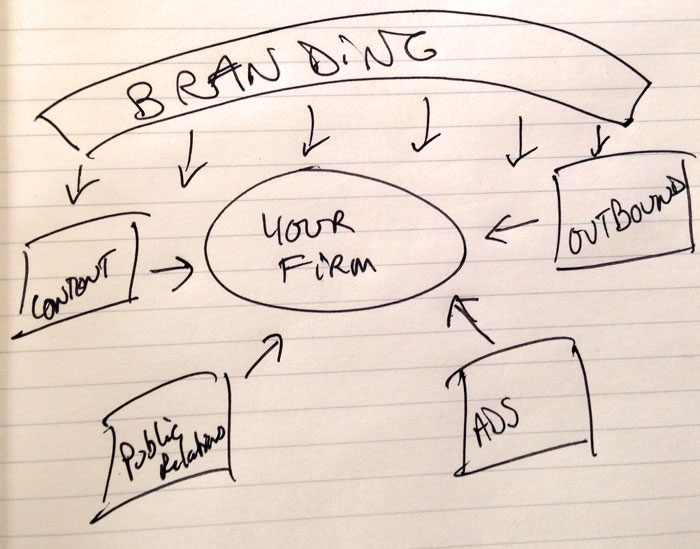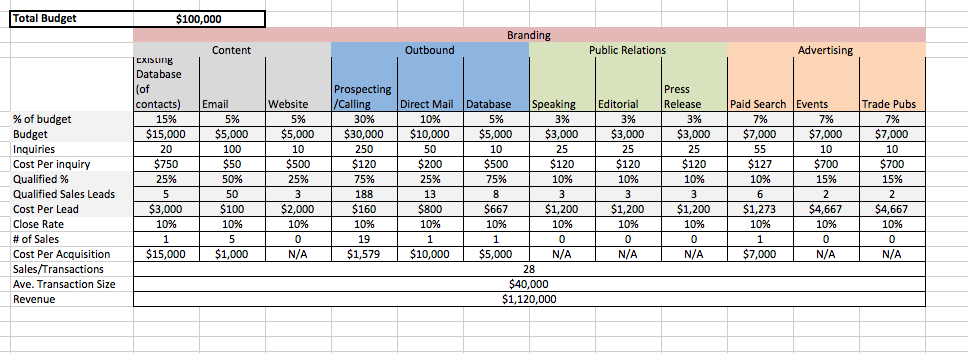Complex Lead Generation – A Big List of Tactics
Complex Lead Generation – A Big List of Tactics
“What’s the best way for us to generate leads?”
A big question with no single answer. In order to demonstrate the depth and breadth of tactics available for a professional services firm, I jump up to the whiteboard and draw a circle.

That’s you. The firm in question. Your goal is to find new business without compromising the prestige and goodwill that you’ve built up over the years by coming across as too “salesy,” however you really need to start building the pipeline. You know you need a plan so you don’t want to jump in. Instead, you send a reminder to your assistant, let’s make time to cover this at our next staff meeting.
In this article, I’m going to help with a 4 step strategic process that has less to do with the depth and breadth of tactics available and more to do with having a process to plug tactics into.
Let’s begin where most strategy starts, with the end in mind.
The list of tactics that your firm will consider for lead generation:
Content – Blogs – Articles – Ebooks – Videos – Speaking – Infographics – Podcasts – Case Studies – Research Papers – Interviews – Social Media
Outbound – Phone calls – Sales calls – Referral calls – Opt In calls – Prospect qualification – Email newsletters – Workshops – Seminars – Training
Branding – Advertising – Sponsorships – Events – Websites
public Relations – Press releases – Interviews – Articles – Newsjacking – Editorials – Associations – Volunteering – Pro-bono work
Advertising – Journal ads – Search engine optimization – Landing page optimization – Pay per click – Sponsorships – Join ventures – Display ads – Direct mail – Conferences – Social media
Your firm won’t try these all at once, but over time you’re bound to give most a shot. If you were standing 2-3 years out, you’d look at these tactics and think “I wonder which tactics are working best?” The answer that you get will depend on how your system is built.
That’s why we begin with the end in mind. Before we try any single tactic, we imagine what life would be like with all the tactics running simultaneously and think about the questions we’d like to have answers to.
That leads us to the second step in our strategic process. Organize the list.
I cheated here because I know the answer. It’s COBRA. Content, Outbound, Branding, public Relations and Advertising. And when I draw it on the board, it looks like this:

Your job is take that giant list of current and future tactics and organize it. Branding hovers over your firm because it’s going to touch all tactics/avenues/channels. There are branding specific tactics, but for this purpose we’re going to consider it “consistent look and feel and message.” The tactics are grouped in clusters around your firm and those arrows represent leads coming into your firm. That visual can be expanded to list the tactics above, but this illustrates the goal. We’re going to employ tactics with the goal of driving new leads into your firm.
Now that we have an idea of what the end result looks like and we’re taken tactics and assigned them to groups, it’s time to move to step 3 in our strategic process: Know what works.
Start with designing a Last Touch Attribution model. There is a lot of talk about measuring multiple touches because decisions aren’t made in a funnel, but for strategic planning purposes, start with designing a last touch attribution model and measure your results.
A quick example: if you’re attending a trade show, think about how you’re going to measure whether or not that trade show contributed to a new client. There are tools that can help with this – Customer Relationship Managers – but you can do a lot with a few spreadsheets and elbow grease. The trick is expecting your people to measure the results.
Don’t believe me? Check out this simple rolled up dashboard that measures a year of activity across tactics.

Predictable Growth Dashboard
Does it look like something you can manage a marketing team with?
Good. Because you can.
That brings us to the last step in our 4 step strategic process. Manage what you measure.
You don’t need me to expound on this one because you’re already doing it. You’re tracking hours, expenses, yields, depreciations and more. You haven’t tracked much in the sales and marketing realm because it’s been said that you can’t measure it accurately. I won’t deny that. . .but I will say that you can generate statistical significance from whatever data you can measure accurately. The effort yields the results.
The key is knowing what the end result is going to look like and taking a few steps and making a few assumptions to learn from before you get there.
In the coming weeks I’ll dig further into the process for you. We’ll talk about some first steps to take, what to do when you start collecting new data and how to build the system so that it learns from itself. A feedback loop.
Start today with a vision of how smart your sales process will be 3 years from now and begin taking the first steps.
Good stuff.
About the Author: Greg Chambers is Chambers Pivot Industries. Get more business development ideas from Greg on Twitter.

